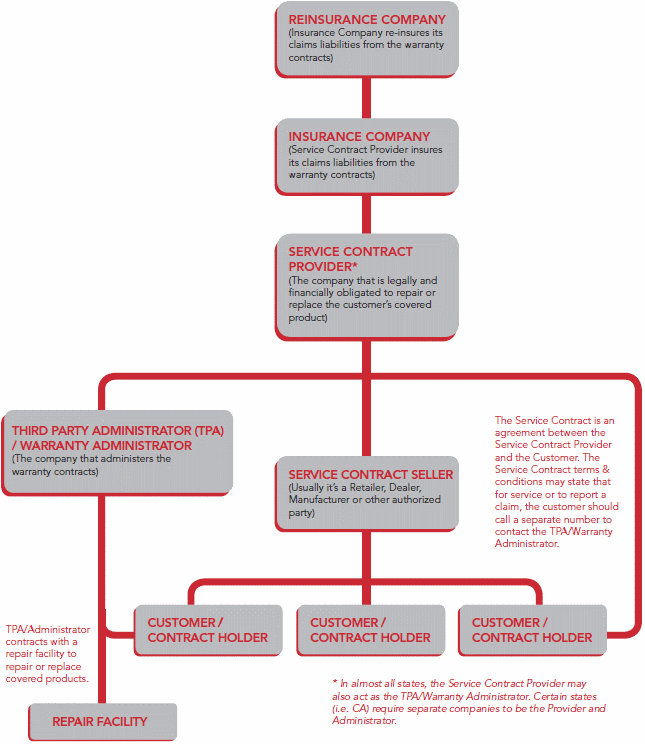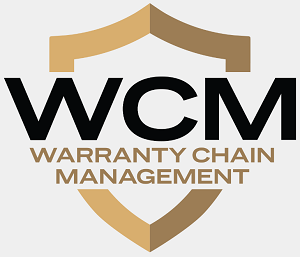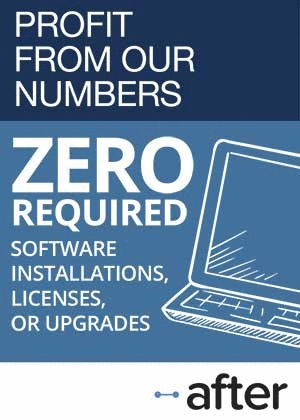February 4, 2010 |

|
ISSN 1550-9214 |
VSC Industry Structure:In a business as opaque as the vehicle service contract industry, it's not always obvious who all the players are or how they all work together. And auto dealers who make the wrong choice of partners may not know it for years.The warranty professionals who read this newsletter probably know the names of all the major players in the service contract industry. But the rest of the world might benefit from a short review of how all the pieces fit together. In most vehicle service contract sales transactions, there are usually three distinct parties involved. There is the seller -- most times it's the auto dealer that sells the covered vehicle. The seller works with an administrator that does all the paperwork. And the administrator works with an insurance company that underwrites and manages the risk. There are numerous variations on this simple model. Sometimes the seller is not an auto dealer. Sometimes the administrator sells directly to consumers, or engages a telemarketing firm to call, mail or email consumers. Sometimes the administrator is also the underwriter. Sometimes the dealer self-administers and self-insures the contracts. But typically, the three roles -- selling, administering, and underwriting -- are filled by three separate companies. Warranty ReinsuranceThere is also a fourth and a fifth role to fill. Underwriters typically transfer some of the risk by engaging with one or several reinsurance companies, such as Swiss Re, Munich Re, General Re, or Hannover Re. And no matter who manages all the risk and shuffles all the paperwork, somebody has to actually repair the vehicles. With new cars, this role is typically filled by a franchised dealer -- quite likely the same dealer that sold the VSC to begin with. But with used cars, if the seller/dealer doesn't have his own service bays, this role will have to be filled by another repair facility. And if the VSC holder is traveling at the time the breakdown occurs, the repair will have to be done by a facility chosen by the driver, administrator, and/or underwriter. AMT Warranty Corp., a subsidiary of AmTrust Financial Services Inc., one of our advertisers, put together the diagram below to illustrate some of the players involved in the provision of a vehicle service contract. Actually, they made it generic enough to apply equally well to consumer electronic service contracts sold by retailers, but this week we'll narrow the focus to just automobiles. The Lifecycle of a Service Contract Source: AMT Warranty So that's the generic block diagram of the industry. The question is, what's the best way to put together a well-run program using these building blocks? There are literally hundreds of administrators out there, and at least a dozen insurance companies and risk retention groups, plus the aforementioned reinsurers and numerous hybrids and all-in-one combinations to choose from. We spoke with Bruce Saulnier, president of AMT Warranty and a vice president at AmTrust, as well as Peter Dewey, the vice president of underwriting for AmTrust, about what they think are the attributes of a well-run vehicle service contract program. And we spoke with Al Sacko, vice president of sales and marketing at OwnerGuard Corp., one of the VSC administrators that works with AmTrust, how the industry looks from the perspective of the middleman. It should come as no surprise that all three agreed that VSC sales made through dealers are better than direct sales to consumers, and that separate companies providing administration and underwriting are a better choice than one company trying to do it all. But all three had some advice for dealers who are looking to evaluate several alternatives and business combinations. Not Just Sell & ForgetFirst and foremost, Saulnier said it's essential for auto dealers to "have some skin in the game," so they participate more fully in the profitability or the loss of the program, as the case may be. That provides them with an incentive to delve a little deeper into the mechanics of the programs, rather than simply comparing them on price or margin. Dewey said he also thinks it's preferable for the dealer to have a vested interest in the success of the program, rather than just selling and forgetting. "If a dealer is going to pay [an administrator a premium] and never see it again, they have a different attitude to if they're going to pay them and ultimately part of that profit or any investment income on that is going to go back into their pocket," he said. Saulnier said dealers should also look for administrators that are willing to allow the dealer to communicate with the underwriter. "In many instances, third-party administrators try to block access to the underwriters," he said, in an attempt to control the flow of information. "They may not want information to be shared. They may not want information such as pricing to be in the hands of the dealers." For instance, the administrator may not want the dealer to know the administrator's cost and/or mark-up. Or the administrator may be worried about the competition. Perhaps the underwriter might pitch their own brand of vertically integrated administration and underwriting services directly to the dealer, cutting them out of the equation? AmTrust would not typically look to provide administration services in the automotive business, Saulnier said, except in cases where one of its administrator becomes insolvent. So far, that hasn't happened, but just in case, he said AmTrust is licensed to operate and is ready to step in. Whether AmTrust was operating in either the insurance or the administrator roles, it would provide full disclosure of costs and margins to its customers, he added. Choosing an UnderwriterAl Sacko, vice president of sales and marketing at OwnerGuard, said his company chose AmTrust as its underwriter because AmTrust seemed more open to opportunities. "We were introduced to them through our reinsurers that we've used over the years," Sacko said, and it was love at first sight. "AmTrust liked the way that we performed, and the longevity that we have in the business, and the expertise. We liked AmTrust because they think outside the box." Yet they're still well-managed and well-capitalized, he added. Saulnier said he and Dewey speak with their administrators on almost a daily basis. "They're very good administrators," he said. "They understand their business very well. Like any good relationship, there are moments where you have disagreements, but we're always able to work through them. But if they weren't good administrators, we would not be a partner with them. The relationship would have been over long ago." Sacko was asked what duties fall to the administrator and what is left for the underwriter. "We're a third-party administrator," he said. "We provide the product. We work with the insurance company to design the coverages, terms and conditions, and the underwriting rules. Then we actually produce that product and put it out through our sales distribution. On the inside of the house, we book all the business that comes through the door. We register it in a computer system so that the actual policies or contracts are set up. The money is sent to the appropriate parties -- obviously off to the insurance company from a risk standpoint, so that they have the money for the risk pool. "And then, in the event that a claim occurs, the consumer or the repair facility would get in touch with us and register the claim. We would then make sure that the claim qualified. We would handle the adjustment side of it, making sure that all the pricing for the repair is in line, and authorizing the claim. Then the dealer or the repair facility would provide us with the final documentation, so that we had the documents proving the charges that we were going to pay in our system. And then we would turn around and reimburse the dealer or the repair facility," he said. VSC vs. Mechanical Breakdown InsuranceSacko said OwnerGuard sells vehicle service contracts through auto dealers in all states except Alaska and Hawaii. In some states, OwnerGuard also provides mechanical breakdown insurance, which differs from a VSC not so much in the coverage, as it does in its structure, who is selling it, and in the regulatory treatment it gets. "A vehicle service contract is not insurance," Sacko noted. "Mechanical breakdown insurance, on the other hand, is an actual insurance policy. So the consumer has an agreement directly with the insurance company. With a vehicle service contract, the consumer has an agreement with, in this case, OwnerGuard." And in some states such as New Jersey, the contract is between the consumer and the dealer that sells them the policy. Sacko said that because OwnerGuard works with AmTrust for both VSC and MBI policies, there isn't much difference between the programs. In either case, OwnerGuard would perform all the administrative work, producing the product, getting it out through distribution, and providing all the claims administration services. The actual coverage is usually the same. The difference is in the insurance-related language of the contract and the regulatory filings that go with it. "If you took our VSC and our MBI policy and you laid them down side-by-side," Sacko said, "they're really the same, with the exception of the pertinent insurance language that appears in the mechanical breakdown insurance policy." The other major difference is in the rates. OwnerGuard's VSCs are sold to dealers at a set wholesale price, which they are free to then mark up and sell to consumers at retail prices. With mechanical breakdown insurance, the actual premium paid by the consumer is set, and is filed with the state's department of insurance. Admitted Carrier vs. Risk Retention GroupFor other programs, there may be major differences between the two. OwnerGuard works with an "admitted carrier" (an insurance company authorized to sell insurance in a given state) as its underwriter. Other VSC administrators may choose to work with a "risk retention group," in which they're a part-owner/member, or they perhaps may decide to self-insure the risk. Opinions differ on the relative financial strength of an RRG and on the wisdom of self-insuring. On a good day, an RRG can be just as reliable and stable as a regulated insurance company, yet less costly to the administrator, dealer, and ultimately to the consumer. On a bad day, well, it will be too late when a dealer or consumer finds out what happens on a bad day. The administrator's phone might be disconnected, and the RRG may turn out to be insolvent. To say the least, that will have a long-term impact on the dealer's customer satisfaction and retention levels. Sacko said he could cut the cost of a VSC by several hundred dollars by going with an RRG rather than with AmTrust as the underwriter. Dealers could then decide to boost their mark-up or cut prices for consumers. But he said he'd rather sleep at night. "I've been in this business for quite a few years," he said. "And I really don't want to worry about it." OwnerGuard has been around since 1989. And service contract companies don't get to be that old unless they're either very lucky or very careful about how they price and underwrite their risk. "But maybe the dealer is willing to roll the dice," Sacko said, and go with a program backed by an RRG. It may work out in the long run. Or it may not. "Risk retention groups have gone through a rough time," Dewey said. They can be as financially stable as insurance companies, but frequently they're not. He suggests that RRGs have a much more appropriate role to play when they're reinsuring or backing up an insurance company, for instance when the dealers selling the policies are the RRG's co-owners. Insurance in the Great RecessionSaulnier noted that during this deep economic downturn, even some of the major insurance companies have run into financial trouble. And perhaps that's another marker for a dealer or a retailer to examine: How did the various insurance companies do in 2008 and 2009? Were they downgraded? Or did they hold onto their financial strength ratings? As with stocks and bonds, there's a ratings agency (A.M. Best) that assigns a grade to each insurance company. Anything lower than a B++ is considered high risk. AmTrust has an A- rating with a positive outlook. "We have been stable," Saulnier said of AmTrust. "We've never taken a big dip. It's a very stable, very focused, and very well-run company. Look at our financials. Look at our stock performance. Look at our filings. It's very consistent." Still, a dealer is free to self-insure and self-administer the vehicle service contracts he sells. And as with the RRG route, that choice may also work out in the long run, from a financial point of view. But it also means that the dealer is going to have to employ people to perform the administration work. The dealer is also going to have to treat the service contract revenue differently, recognizing it gradually as the life of the contract advances. And, if the dealer lacks its own service bays, it is going to have to pay a repair shop for the work it does on covered vehicles. But while many of the underwriters are public companies that produce ample paper trails at both the state and federal level, many of the administrators are closely-held companies that don't typically reveal much about themselves. And since the administrator usually chooses the underwriter, a dealer is going to have to accept both or neither. What a Dealer Should Look ForSacko suggested that when a dealer is evaluating multiple service contract programs, there are a handful of attributes that can help them make the difficult choice. First, look for a simple product design that has just a few tiers, not one that requires the input of all the intimate details about make, model and trim before a price quote can be provided. Second, the dealer should look at the longevity and the reputation of the administrator, not only nationally but also locally, and should factor in the reputation and personality of the local and regional people they'll be working with. Third, they need to look at the technology deployed by the administrator, in terms of the web and online interfaces they're going to use for data entry and file transfer, as well as the call center and customer service representatives they and their customers are going to use. And finally, the dealer needs to look at not only the price and profitability of the VSC programs, but also how they might fit into other aftermarket services, financial and insurance offerings that he may want to offer as part of a package. Some dealers want to mix and match offerings from multiple sources for GAP insurance, anti-theft, rustproofing, etc., while others want to work with one company for all of them. Making the Nightly NewsReputation is becoming even more crucial in the current market, not only because vehicle sales have slowed and buyers are questioning every additional expense they're offered in the business office. In the past two years, some of the direct sellers have become such a nuisance through their hard sell postcards and phone calls that it's tainted the reputation of the whole industry in the minds of consumers. It has little to do with the seller's choice of administrator or underwriter. Whether a given vehicle service contract was sold direct or by a dealer, the claims were paid and the policies were administered. That's not an issue in any of the complaints. However, in the case of the direct sales, certain sellers' allegedly aggressive marketing policies got them into trouble with the attorneys general and the consumer protection agencies. And that has created a bit of a backlash for all. The problem that most of the companies that found themselves in trouble with the law had was in relation to their allegedly misleading sales practices and/or their allegedly tough refund and cancellation policies. But the culprits were usually just the sellers, not the administrators or the underwriters of the policies. And they were usually selling directly to consumers, not through franchised or independent dealers. Some used the infamous "expiring warranty" pitch in their postcards and phone calls, while others simply went into TV and print advertising campaigns. All seemed to go just a little over the top, to the detriment of the entire industry. "I'm far less concerned with the dealer than I am with the consumer's confidence in buying extended warranties," Saulnier said. And that is severely impacted by the headlines about the lawsuits and enforcement actions. "That's my biggest concern: the health of the industry." | ||||||||||||||||||||||||||||||||||||||||||||||||||||||||||||||||||||||||||||||||||||||||||||||||||||||||||||||||||||||||||||||
| ||||||||||||||||||||||||||||||||||||||||||||||||||||||||||||||||||||||||||||||||||||||||||||||||||||||||||||||||||||||||||||||








